Making Avengers: Endgame the Big Bang of the MCU, the magnum opus that everything had been building toward, ensured that it would be one of the most commercially successful movies ever. Unfortunately for Kevin Feige and company, it also ensured that everything that followed would feel anticlimactic.
Endgame was the second-highest-grossing movie of all time and the only film in the top four not directed by James Cameron. It leaves behind a bleak legacy: because it was so successful, it convinced Netflix to waste 300 million dollars making The Electric State with the movie’s co-directors, The Russo Brothers.
This is a post for another time, but it seems very weird that Cameron has now directed two of the three top-grossing films in history. Yet, considering their astonishing box office, both Avatar movies seem to have left behind a shockingly small cultural footprint.
To put things in sports terms, the MCU has been in rebuilding mode since then. The big-money superstars have largely retired from their iconic roles.
The most successful post-Avengers MCU movie, Deadpool & Wolverine, brought two superheroes who were already extraordinarily popular into the fold when Marvel desperately needed all the star power it could get. That helps explain why Harrison Ford is red and apoplectic as the head bad guy in Captain America: New World Order, a sequel that replaces Chris Evans’ Captain America with Anthony Mackie’s less popular and expensive Falcon.
Thunderbolts* heavily features a much less distinguished version of Captain America in the form of John Walker/US Agent (Wyatt Russell), a character who answers the question: what if Captain America was kind of an asshole?
To its credit, Thunderbolts* leans into being a scrappy, underdog endeavor featuring super(ish)heroes infinitely less famous and popular than your Iron Mans and Incredible Hulks.
Thunderbolts* distinguishes itself from the four thousand, three hundred and forty six MCU movies that preceded it by taking the piss out of itself, Deadpool-style, but less annoyingly edgy. The overachieving comic book movie is deadpan in its absurdity.
It has a tremendous asset in Florence Pugh as Yelena Belova. She’s the adopted sister of Scarlett Johannson’s Natasha Romanoff and a fellow graduate of the Red Room, where nightmares are made and secret agents created.
Pugh invests an awful lot of melancholy into a badass comic book superhero. The dry-witted depressive is defined by her lingering angst as much as her impressive murder skills.
This may be a superhero team-up movie and an ensemble, but Pugh is the leading lady. She benefits from David Harbour’s charming and funny portrayal of Red Guardian, a father figure and enduring embarrassment to Yelena. He’s a gleeful goof but observant enough to remark of Yelena, “The light inside you is dim even by European standards.”
Red Guardian is the Soviet Union’s sub-par, off-brand answer to Captain America. Harbour plays him as a lovable cheeseball with a wholesome idealistic streak that sets him apart from his teammates.
Yelena, John Walker, and C-listers Ghost and Taskmaster are dispatched to a covert facility and pitted against one another. The antiheroes don’t realize that they’ve been set up on a murder-suicide mission and must work together to survive.
Ghost kills Taskmaster, and the remaining agents meet Bob, who appears to be just some guy. I spent Thunderbolts* wondering which famous actor the gentleman portraying Bob reminded me of. I settled on Timothy Hutton before a trip to Wikipedia revealed that he’s Bill Pullman’s son. He’s not the only Nepo Baby in the mix.
It doesn’t make sense for some dude to be in a covert facility alongside agents from around the world. Bob can’t just be a man. He has to have a more impressive destiny, although part of me wanted Bob to remain a random bro in a battle between forces of good and evil.
Thunderbolts* sets itself apart from the rest of the MCU through its modest scope. This isn’t a globe-trotting blockbuster full of epic set-pieces in front of major international landmarks.
The Thunderbolts spend much of the first half trying to survive each other, and Wyatt Russell plays John Walker/US Agent, who has his father’s rogueish, irascible charm.
Having the lesser-known progeny of famous actors play Bob and John Walker/US Agent adds to the sense that Thunderbolts is filled with B and C-listers since the A team has graduated with honors to non-MCU fare.
Bob turns out to be something simultaneously expected and unexpected. It’s not exactly revolutionary for a character who has been experimented upon to become a superhero. It’s also not a radical departure for a mysterious figure in a comic book movie to emerge as a super-villain.
In a real twofer, Bob has powers far beyond the Thunderbolts’ combined. He’s ostensibly stronger than the Avengers together. Bob becomes The Sentry, a vaguely Aryan-seeming superhero whose costume, honestly, could use a little work. He looks less like a proper hero than one of the Mystery Men. Alternately, he looks like a Super-Twink.
Nefarious CIA director Valentina Allegra de Fontaine (Julia Louis-Dreyfus), the scheming pragmatist who brought the Thunderbolts together so that they could kill one another, has big plans for The Sentry.
She wants the Sentry to do her bidding. Being CIA director isn’t enough for her. She doesn’t just want super-powers. She wants the power of a God.
Valentina learns the hard way that superheroes do not like being controlled. The Sentry gives in to his dark side and becomes Void, a super-villain who reduces people into dark, ashen smudges.
The Thunderbolts have assistance in their battle with Valentina in Bucky Barnes (Sebastian Stan), a contemporary of the Steve Rogers incarnation Captain America with a cybernetic arm who has overcome brainwashing and various battles involving the Avengers to become a congressman.
Bucky might be the leader of the Thunderbolts, but his gloomy intensity makes him less colorful and entertaining than his wilder cohorts.
Stop reading if you do not want the ending of Thunderbolts* spoiled.
The Thunderbolts are finally in a position to wreak righteous vengeance on the woman who brought them all together by sending them to kill each other.
Instead, Valentina Allegra de Fontaine tricks them into appearing at a press conference to announce they are the New Avengers. They seem as surprised as anyone.
It’s a sublime conceptual gag that makes rich satirical sport out of the gulf in awareness and popularity between The Avengers, who are just about the biggest thing in pop culture (or at least comic book movies), and the Thunderbolts*, who are dazzling in their relative obscurity.
Thunderbolts* represents something new and original, or at least semi-original, in a superhero boom/best that has left us all exhausted and depleted. This spunky, overachieving outlier suggests some life remains in one of the most exhausted realms in pop culture.
3.75 Stars out of 5




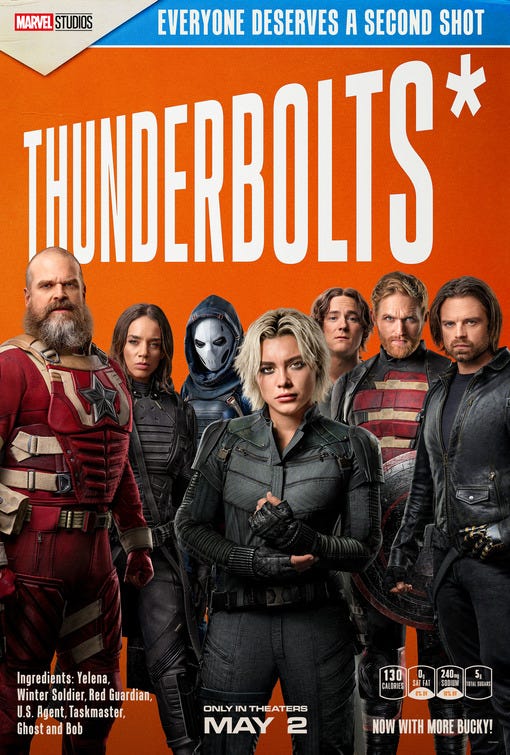

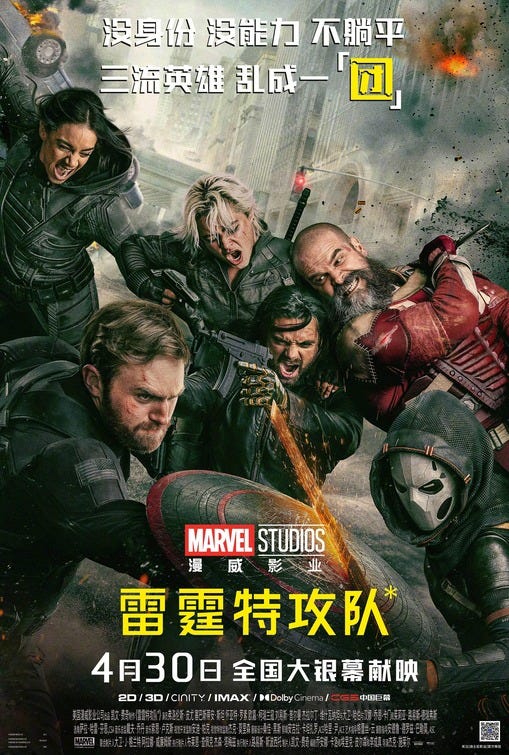
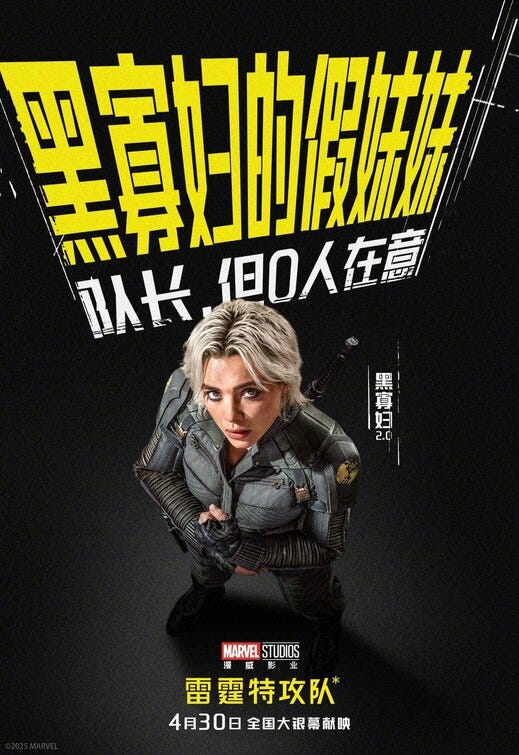
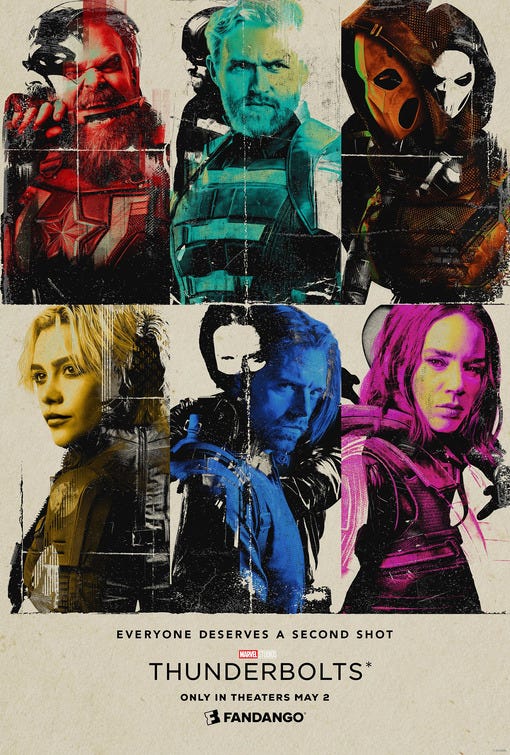
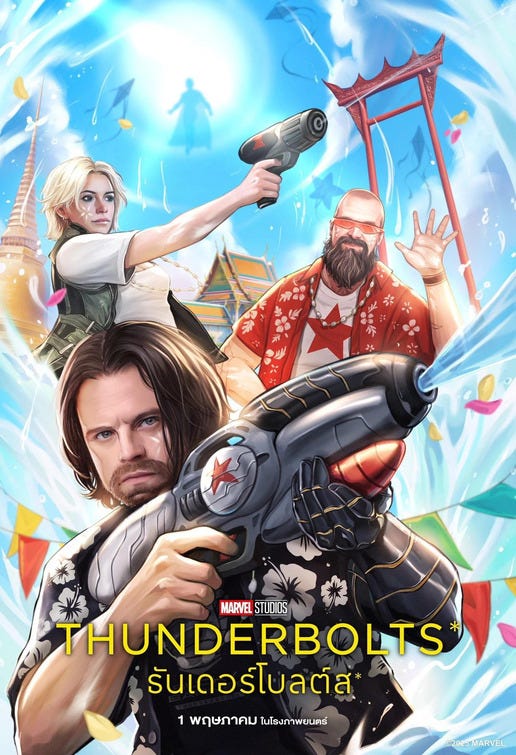
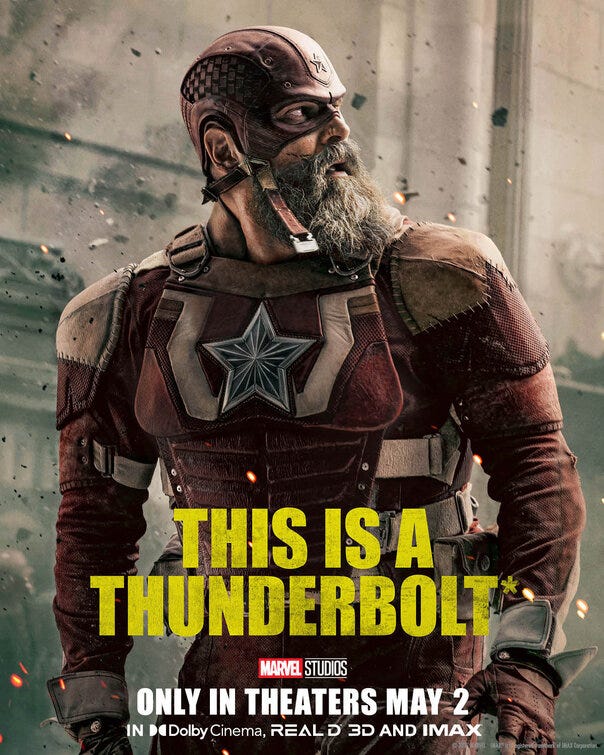
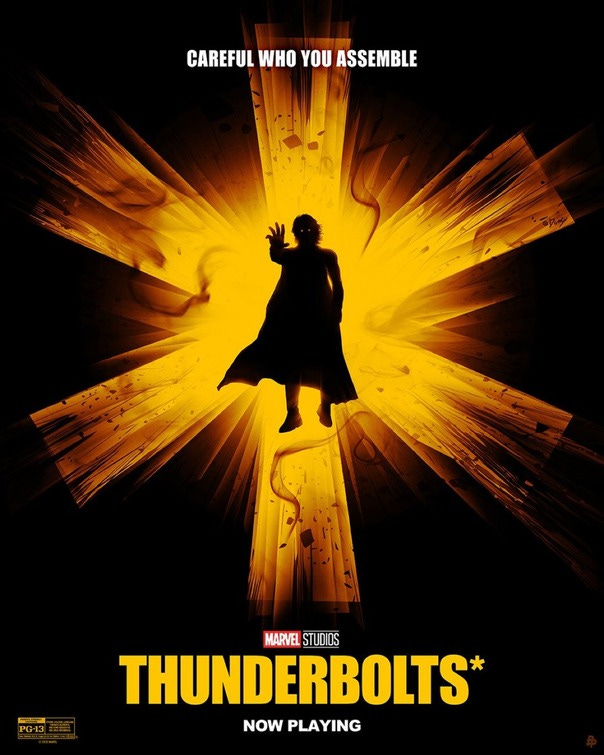


I was thinking about John Walker. He could be an interesting character, kind of an angry Captain America, but there wasn't enough in the movie to show why he was this way. I they need a small movie or TV show to go through his life after the Winter Soldier show, but would anyone watch that?
But what does the asterisk mean?